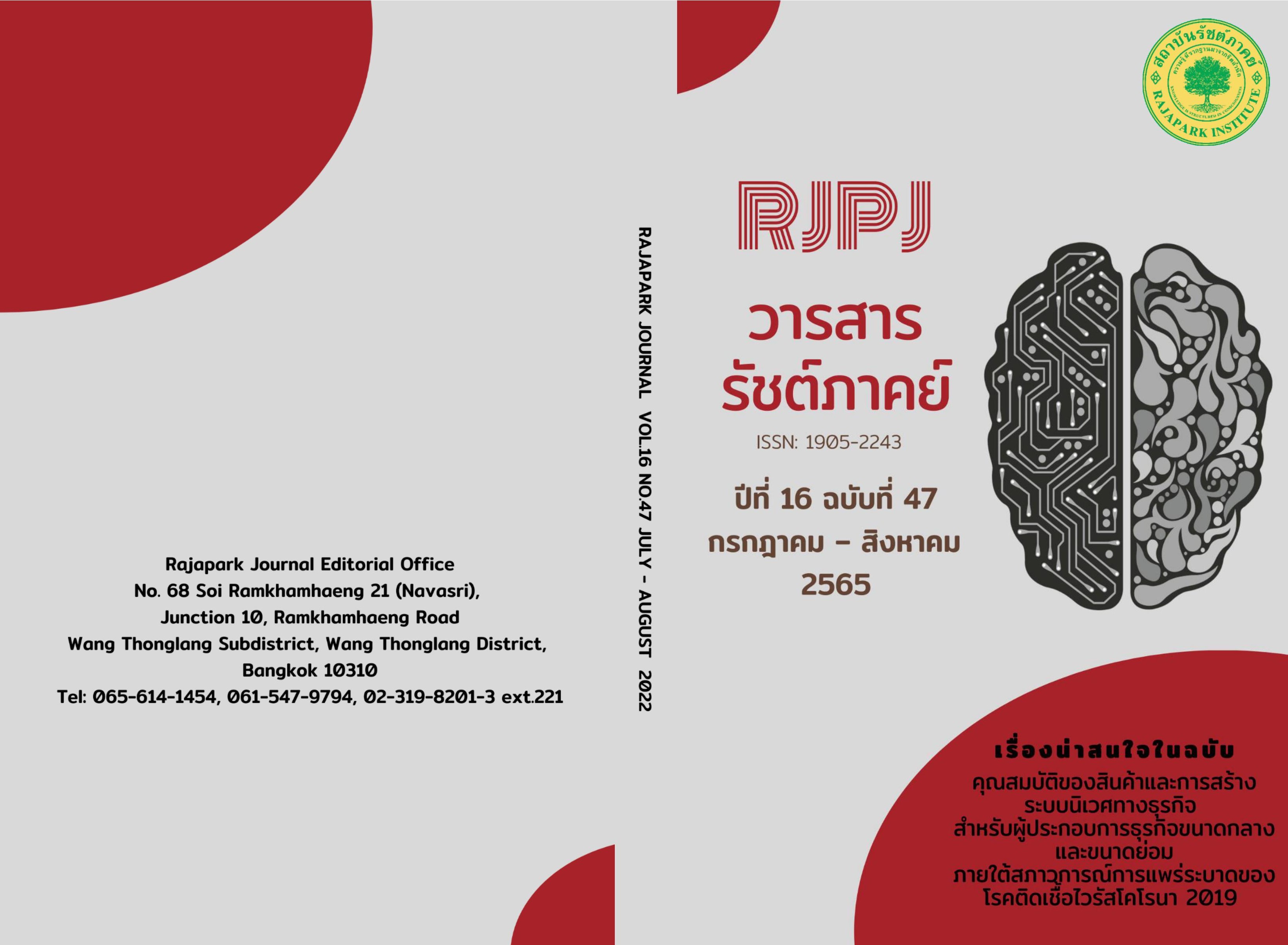The Doctrine of Originality in Copyright Regime Through, Economic, Social, and Cultural Dimension
Main Article Content
Abstract
Originality is an important principle. However, there is no firm criteria for originality and a level of creativity in both international law and the copyright laws of different countries. Hence, it results in many countries having their own definition of similarity or difference that affects interpretation. Adhering to whatsoever significant criterion, any impact on the norm of looking at these images that brings about clarity as well as various works of art having differences in originality and level of creativity cannot lead to an inability to view based on any particular criterion. Therefore, in order to determine criteria of originality for any relevant organization or court to exercise discretion through perspectives toward the dimensions of the economy, society, and culture. The research on the principle of originality in the copyright regime through economic, social, and cultural dimensions was qualitative research. Data were collected by documentary research and synthesis results in discussions based on objective research reports. The key element in how a court determines whether an event is original or not is to include such an important element as self-initiation with a little perseverance and originality in creative work.
Article Details

This work is licensed under a Creative Commons Attribution-NonCommercial-NoDerivatives 4.0 International License.
Views and opinions appearing in the Journal it is the responsibility of the author of the article, and does not constitute the view and responsibility of the editorial team.
References
Abrams, H. B. (1992). Originality and Creativity in Copyright Law. Law and Contemporary Problems, 55(2), 3-44. https://doi.org/10.2307/1191773
Bently, L., Sherman, B., Gangjee, D., & Johnson, P. (2018). Intellectual Property Law (8th ed.). Oxford University.
Coombe, R. J., & Turcotte, J. F. (2012). Cultural, Political, and Social Implications of Intellectual Property Law in An Informational Economy. https://rcoombe.blog.yorku.ca/files/2014/10/ Coombe-and-Turcotte_2012_Cultural-Political-And-Social-Implications-Of-Intellectual-Property-Laws-In-An-Informational-Economy.pdf
Correa, C. M. (2000). Intellectual Property Rights, the WTO and Developing Countries: The TRIPS Agreement and Policy Options. Zed Books.
Correa, C. M. (2007). Trade Related Aspects of Intellectual Property Rights: A Commentary on the TRIPS Agreement. Oxford University.
Drahos, P. (1996). A Philosophy of Intellectual Property. Dartmounth.
Gervais, D. J. (2004). The Compatibility of the ‘Skill and Labour’ Originality Standard with the Berne Convention and the TRIPs Agreement. European Intellectual Property Review, 26(2), 75-80.
Gutterman, A. S., & Anderson, B. J. (1997). Intellectual Property in Global Markets: A Guide for Foreign Lawyers and Managers. Kluwer law International.
Hariani, K., & Hariani, A. (2011). Analyzing ‘Originality’ in Copyright Law: Transcending Jurisdictional Disparity. IDEA, 51, 491. https://heinonline.org/HOL/LandingPage?handle=hein.journals/idea51&div=19&id=&page=
IIardi, A., & Blakeney, M. (2004). International Encyclopaedia of Intellectual Property Treaties. Oxford University.
Kotigala, M. I. (2016). Rethinking Originality in Copyright Law Exploring the Potential for a Global Threshold. https://www.researchgate.net/publication/311377345_Rethinking_Originality_in_Copyright_Law_and_Exploring_the_Potential_for_a_Global_Threshold
Okediji, R. L. (2009). The Regulation of Creativity Under the WIPO Internet Treaties. Fordham Law Review, 77(5), 2379-2410. https://ir.lawnet.fordham.edu/flr/vol77/iss5/12
Pinyosinwat, J., & Butr-indr, B. (2021). Intellectual Property Law. Faculty of Law, Thammasat University.
Ricketson, S., & Ginsburg, J. C. (2006). International Copyright and Neighboring Rights: The Berne Convention and Beyond. Faculty Books, 96. https://scholarship.law.columbia.edu/books/96
Yen, A. C. (1991). The Legacy of Feist: The Consequences of a Weak Connection between Copyright and the Economics of Public Goods. Ohio State Law Journal, 52, 1343-1378.


